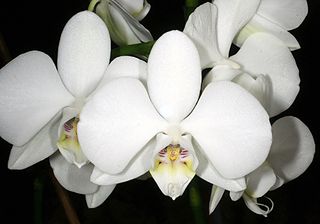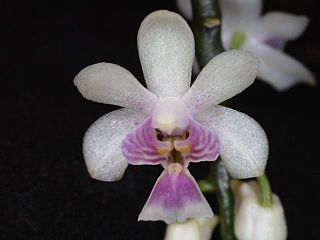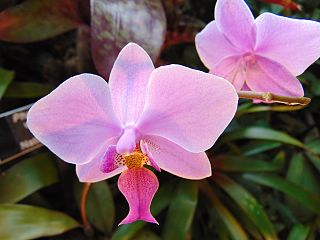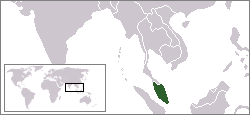Related Research Articles

In the botanical classification of plants, Aeridinae Pfitzer is a subtribe of the tribe Vandeae whose representatives all have a monopodial growth habit and do not possess pseudobulbs.

Vanda, abbreviated in the horticultural trade as V., is a genus in the orchid family, Orchidaceae. There are about 87 species, and the genus is commonly cultivated for the marketplace. This genus and its allies are considered to be among the most specifically adapted of all orchids within the Orchidaceae. The genus is highly prized in horticulture for its showy, fragrant, long-lasting, and intensely colorful flowers. Vanda species are widespread across East Asia, Southeast Asia, and New Guinea, with a few species extending into Queensland and some of the islands of the western Pacific.

Phalaenopsis, also known as moth orchids, is a genus of about seventy species of plants in the family Orchidaceae. Orchids in this genus are monopodial epiphytes or lithophytes with long, coarse roots, short, leafy stems and long-lasting, flat flowers arranged in a flowering stem that often branches near the end. Orchids in this genus are native to India, Taiwan, China, Southeast Asia, New Guinea and Australia with the majority in Indonesia and the Philippines.

Heinrich Gustav Reichenbach was a botanist and the foremost German orchidologist of the 19th century. His father Heinrich Gottlieb Ludwig Reichenbach was also a well-known botanist.

Thomas Lobb (1817–1894) was a British botanist and, along with his older brother, William Lobb, collected plants for the plant nursery Veitch.

Sir Harry James Veitch was an eminent English horticulturist in the nineteenth century, who was the head of the family nursery business, James Veitch & Sons, based in Chelsea, London. He was instrumental in establishing the Chelsea Flower Show, which led to his being knighted for services to horticulture.

Phalaenopsis stobartiana, also known as 滇西蝴蝶兰 in Chinese, is a species of epiphytic plant in the family Orchidaceae. It is endemic to Hainan, China. The specific epithet stobartiana refers to William Culley Stobart. The Stobart family were the principal landowners and colliery owners in the 19th century in England.

Phalaenopsis micholitzii is a species of plant in the family Orchidaceae. It is endemic to the Zamboanga peninsula in the island of Mindanao, Philippines.

Phalaenopsis amabilis, commonly known as the moon orchid, moth orchid, or mariposa orchid, is a species of flowering plant in the orchid family Orchidaceae. It is widely cultivated as a decorative houseplant. It is an epiphytic or lithophytic herb with long, thick roots, between two and eight thick, fleshy leaves with their bases hiding the stem and nearly flat, white, long-lasting flowers on a branching flowering stem with up to ten flowers on each branch.

Robert Allen Rolfe was an English botanist specialising in the study of orchids. For a time he worked in the gardens at Welbeck Abbey. He entered Kew in 1879 and became second assistant.

Phalaenopsis taenialis, also known as 小尖囊蝴蝶兰 in Chinese, is a species of epiphytic orchid occurring from the eastern Himalaya to China (Yunnan). The specific epithet taenialis is derived from the long, flattened roots, which resemble tapeworms. The specific epithet taenialis, from the Latin taenia, means ribbon or band.

Phalaenopsis deliciosa is a species of orchid occurring from the Indian subcontinent to Malesia and China. The species is a miniature epiphytic herb. The leaves are unique due to their undulate margins. This characteristic greatly simplifies the identification of the species, even when specimens are not currently flowering. The small flowers are usually slightly pink, but white and yellow forms exist as well. Old inflorescences, which are usually panicles or more rarely racemes, may continue to grow and form new flowers over several flowering periods.

Phalaenopsis tetraspis is a species of epiphytic orchid endemic to the Andaman Islands, the Nicobar Islands and northwestern Sumatra. It was originally erroneously published as a Himalayan species by Reichenbach, which was corrected by James Veitch 23 years after Heinrich Gustav Reichenbachs publication. Mature specimens may have up to nine leaves, but usually plants have 4–5, elliptic-obovate, acute to obtuse, 20 cm long and 8 cm wide leaves. Showy, fleshy, fragrant flowers are produced on axillary, arching to subpendent racemes or panicles. A prominent feature of this species is the midlobe of the labellum, which is oblong, obtuse-subacute, and the apex is covered in dense trichomes. The karyotype is asymmetric and nonuniform.

Phalaenopsis violacea is a species of orchid endemic to the Andaman Islands, the Nicobar Islands and northwestern Sumatra.

Phalaenopsis × intermedia, the intermediate phalaenopsis, is a natural occurring hybrid of epiphytic orchid endemic and most commonly seen orchid species in the Philippines. A progeny of Phalaenopsis aphrodite and P. equestris, this orchid thrives in the heat of the lowlands, in primary and secondary forests at an altitude of sea level to 300 meters where it blooms all year round. Unlike other natural hybrid within the genus, P. × intermedia is seldom found growing within the range of its parent species and has formed sexually reproducing, stable populations in the wild. All red-lipped Phalaenopsis have pedigrees that can be traced back to this orchid.

Phalaenopsis × veitchiana is a species of orchid endemic to the Philippines. It is a hybrid of Phalaenopsis equestris and Phalaenopsis schilleriana. It occurs naturally and has also been artificially re-created. It is named after the British horticulturalist Harry J. Veitch.

Phalaenopsis × valentinii is a species of orchid native to peninsular Malaysia. It is a natural hybrid of Phalaenopsis violacea and Phalaenopsis cornu-cervi.

Phalaenopsis × singuliflora is a species of orchid native to Borneo. It is a natural hybrid of Phalaenopsis bellina and Phalaenopsis sumatrana. Its name singuliflora is derived from the consecutively produced flowers.

Phalaenopsis × gersenii is a species of orchid native to Borneo and Sumatra. It is a natural hybrid of Phalaenopsis violacea and Phalaenopsis sumatrana. It is named after Gerrit Jan Gersen (1826-1877). He was a Dutch official, who was deployed to the Dutch East Indies, where he also was active as a plant collector of the Malesian region.

Phalaenopsis × rolfeana is a species of orchid native to the Philippines. It is a hybrid of Phalaenopsis equestris and Phalaenopsis sanderiana.
References
- ↑ Sarah Forsyth (2011). "Top of the pots". The Garden. RHS Media. 136 (12): 33.
- ↑ "Phalaenopsis Hybridizing". Archived from the original on 26 April 2012. Retrieved 17 December 2011.
- ↑ "Phalaenopsis Harriettiae" . Retrieved 17 December 2011.
- ↑ "Phalaenopsis × harriettae Rolfe". International Plant Names Index (IPNI). Royal Botanic Gardens, Kew; Harvard University Herbaria & Libraries; Australian National Botanic Gardens . Retrieved 11 December 2023.
- ↑ "Orchid Hybrid: Phalaenopsis Harriettiae". Orchids.org. International Orchid Foundation. Retrieved 11 December 2023.